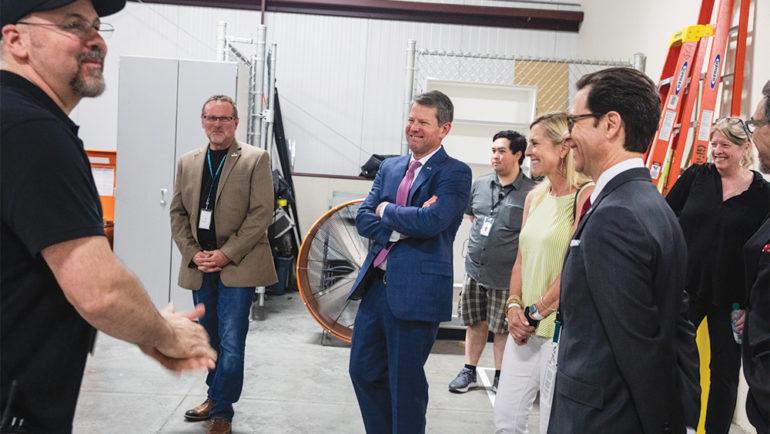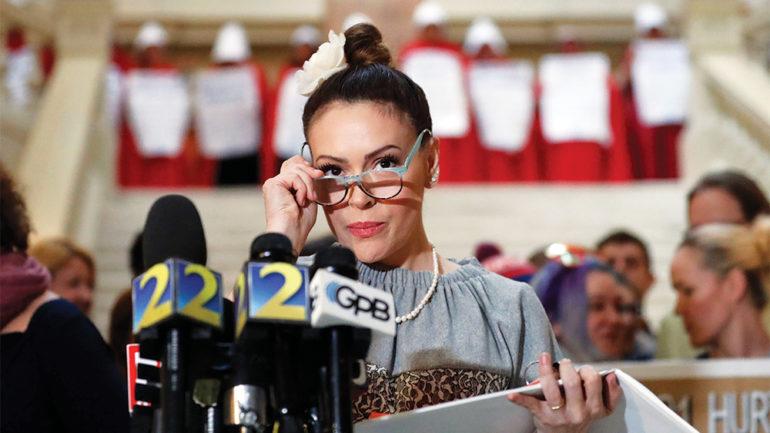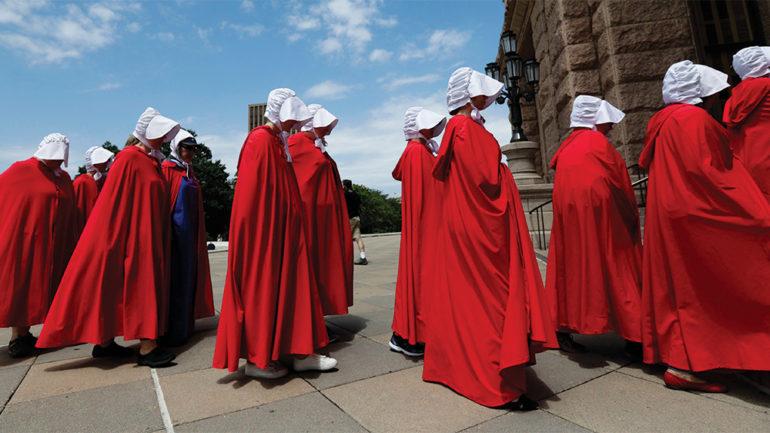Netflix the Only Hollywood Studio to Speak Out in Attack Against Abortion Rights (EXCLUSIVE)
By Matt Donnelly
LOS ANGELES (Variety.com) – Many of Hollywood’s most powerful content companies have maintained a deafening silence on the raging abortion legislation debate that’s sweeping the country as their star talent and producers go off script to speak out about threats to women’s reproductive rights and boycott states like Georgia that have signed the bills. Protests are erupting on the ground and across social media as seven other states — including Alabama, Missouri and Ohio — also adopt anti-abortion laws.
Most of the industry uproar is currently focused on Georgia, where a massive number of Hollywood movies and TV shows film thanks to a highly favorable state tax incentive.
Following Georgia Gov. Brian Kemp’s May 7 signing of a bill that aims to outlaw abortion after the detection of a fetal heartbeat, powerhouse female creators like “The Handmaid’s Tale” breakout director Reed Morano and the Oscar-nominated writing team behind “Bridesmaids,” Kristen Wiig and Annie Mumolo, abandoned plans to film in the state. Actor and talk-show host Busy Philipps fronted an ad campaign with the ACLU countering what she said is an attempt by the Trump administration to undermine the nearly 50-year-old precedent set by Roe v. Wade, via multistate anti-abortion bills. Actors like “Titanic” star Frances Fisher and local women in the film industry picketed on the steps of Atlanta City Hall.
“It’s hard to wake up every day feeling like I’m growing up in my mother’s generation,” says veteran producer Lori McCreary, former president of the Producers Guild of America and CEO of Revelations Entertainment. “I don’t have anything that’s shooting in those locations, but I would give it a second thought in those states because I think it’s important for us to support [women].”
The momentum for projects to snub the state comes in the face of a sad reality — many detractors of the bill who live in places like Georgia and work in film and TV face losing their jobs.
Calls for a flat-out boycott continue to gain traction across the industry, despite a move from several high-profile filmmakers to keep their productions in Georgia but donate their salaries and fees to the ACLU and local activist groups combating the legislation. Creators behind those shows include J.J. Abrams and Jordan Peele, Peter Chernin and Jenno Topping, and Ron Howard and Brian Grazer’s Imagine Entertainment.
“A woman’s right to make choices about her own body is fundamental to her personal and professional well-being,” Kirsten Schaffer, executive director of the nonprofit group Women in Film, told Variety in an exclusive statement. “We support people who make the choice not to take their production to Georgia or take a job in Georgia because of the draconian anti-choice law. To that end, we’ve compiled a list of pro-choice states that offer meaningful tax rebates and production incentives, and encourage everyone to explore these alternatives: California, Colorado, Hawaii, Illinois, Maine, Nevada, New Jersey, New Mexico, New York, Washington.”
Media companies with deep financial investments in the state have so far remained mum on the matter. Not one major studio would comment on the ongoing issue when approached by Variety, including the film and TV divisions at The Walt Disney Co., WarnerMedia, Sony Pictures Entertainment, NBCUniversal, Viacom, Fox and Amazon Studios.
The only company to respond to Variety’s inquiries was Netflix. “We have many women working on productions in Georgia, whose rights, along with millions of others, will be severely restricted by this law,” Ted Sarandos, ’s chief content officer, said in an exclusive statement. “It’s why we will work with the ACLU and others to fight it in court. Given the legislation has not yet been implemented, we’ll continue to film there, while also supporting partners and artists who choose not to. Should it ever come into effect, we’d rethink our entire investment in Georgia.” CBS referred Variety to comments made by its entertainment president Kelly Kahl, who said at the network’s recent upfront presentation that he would monitor the bill’s progress toward becoming law.
“A woman’s right to make choices about her own body is fundamental to her personal and professional well-being.”
Kirsten Schaffer, Women in Film
Varied individual responses to the legislation on the producer level find these companies in increasingly awkward positions of conflict. Lionsgate Entertainment, for instance, which is distributing the feature comedy “Barb and Star Go to Vista Del Mar,” from Wiig and Mumolo, must find a new shooting location after producers decided to leave the state. The Lionsgate-owned premium TV network Starz will air the series “P-Valley,” from producer Chernin, which has decided to continue filming in Georgia but make a donation to the resistance effort. The studio would not comment on either of these decisions, nor offer any overall point of view from its leadership.
Some in the entertainment business maintain that boycotting may ultimately not have the intended impact.
“Saying, ‘We’re going to yank production out of your state if you don’t reverse,’ I’m not sure Kemp cares about that. It feels as though he’s willing to risk jobs and millions of dollars to be the hero that gets his law to go to the Supreme Court,” says Heidi Lindelof, who along with her showrunner husband, Damon Lindelof, sits on the board of the Center for Reproductive Rights.
Actress Elizabeth Perkins says the matter is not as nuanced. “I think we need to fight like hell, fight like our lives depend on it, because they do,” the actress said in a recent interview with Variety at an industry event. “And I’ll do anything I can to make sure this doesn’t pass. We sort of knew this when we lost the election; we saw this coming. It’s obviously a coordinated effort, and we have to fight it with everything we have.”
Loni Love, a comedian and panelist on the female-centric talk show “The Real,” says the measure puts women at risk: “You’re not going to stop abortion — you’re just going to make unsafe abortions. You have to start fighting in that area so you fight for your sisters to have control over their bodies.”
The major studios continue to rely on the Motion Picture Assn. of America, their collective voice in Washington, to play a role in the mess. At the time Kemp signed the heartbeat bill, the MPAA said it would monitor the legislation’s path toward becoming law, which could occur Jan. 1. There is wide expectation for the bill to escalate to circuit courts, where it might be struck down. In the same breath, the MPAA underscored the human cost of boycotts. Last year, Georgia reported some 92,000 jobs and an economic impact of more than $9 billion from production.
That level of commitment is at risk. Since establishing a generous 30% tax rebate in 2008, Hollywood has planted deep roots in both the metropolitan and rural areas of Georgia. Expansive facilities like Pinewood Atlanta Studios and its 18 soundstages and 400-acre backlot have been home to major productions like “Black Panther” and “The Hunger Games.” The town of Senoia, Ga., has served as a set for AMC’s blockbuster TV franchise “The Walking Dead.” Over the past decade, a great migration of artisans and craftspeople, such as carpenters, designers and technicians, have left Southern California and decamped to Georgia, where jobs have been plentiful and the cost of living is more attractive than setting up shop in L.A.
| Georgia Gov. Brian Kemp tours Pinewood Atlanta Studios. The governor’s decision to sign a bill limiting abortion rights could cost workers their jobs. Courtesy of Office of the Governor |
Lynn Hylden, a 38-year-old producer, left a freelance career in reality TV in L.A. to join a scripted series in Atlanta in 2011. She did not expect to remain in the state, but Georgia became a “land of opportunity,” she says. Currently a single mother, Hylden says her partner at the time encouraged her to terminate her pregnancy. She declined. “I elected not to do that,” Hylden says, adding she is “particularly thankful for the Georgia industry because I’m able to raise a child on my own.”
Hylden, whose credits include “Being Mary Jane,” says the boycotts hit home because “by choosing to have a child, I’ve doubled down on my career. I’ve doubled down on what I’m doing as a producer. I’ve grown, and it makes me stand up every day to actually have conversations like this, because as everybody says, it’s bigger than just me.”
Actress and freelance headshot photographer Jessica Roth, a Los Angeles native who attended the USC School of Cinematic Arts, has lived in Atlanta for three years. Speaking to Variety just a day after wrapping a commercial, she says she hopes the industry will stay in Georgia, but feels the issue transcends Hollywood. “It’s a support of basic human rights,” she says. “And the millions of women who are affected should have that right to make that decision with their bodies and health. That reproductive right is bigger than the film industry.”
Roth says she would leave Georgia and start over should production flee, suggesting it would have “a huge financial impact,” but she would be willing to go if it meant standing against Kemp and the bill. She says the majority of her friends and colleagues, including many of the people on the set of her commercial, also oppose the new law.
Other transplants have no desire to uproot the communities they’ve built. Druscilla Smith, 35, who runs various production offices, moved from her hometown of Shreveport, La., to Atlanta in 2014. Politics often have little impact on the bonds formed on set.
“I hate that Hollywood has to come to this point of saying that if this rule doesn’t get changed, then we’re going to boycott your state. … All of us — everybody in Atlanta that’s in the film industry — can’t go back to California [and] work. We all can’t go to New York and work.”
Entertainment industry workers are most certainly “collateral damage” in this conflict, says Martha Lauzen, executive director of the Center for the Study of Women in Television and Film at San Diego State University. “Productions and individuals boycotting the state are making it clear that this bill compromises women’s well-being and is unacceptable,” Lauzen tells Variety. She calls such action a “blunt instrument” on Hollywood’s part to communicate its feelings on the legislation.
| Actress Alyssa Milano delivers an open letter signed by Hollywood activists to Georgia Gov. Brian Kemp’s office, detailing opposition to the state’s fetal heartbeat legislation. John Bazemore/AP/REX/Shutterstoc |
“The unfortunate reality is that individuals working in behind-the-scenes roles are caught in the middle of this highly charged political issue,” she says. “We’ll have to see how it plays out over the coming months.”
The economic importance of Hollywood’s ties to Georgia are not lost on Kemp, whose tactic in wake of the bill has been to focus on the production facilities in his state. Last week, he toured Pinewood and stages at the Georgia Film Academy to bolster the state’s commitment to retaining the industry. He canceled an annual “Georgia Night” celebration scheduled for late May at the swanky Sunset Tower Hotel in West Hollywood, Calif., and postponed pre-scheduled meetings with Hollywood studio heads until fall.
Conservatives and other Georgia-based politicians have not been as subtle about their feelings toward pushback from the left coast, taking swipes at entertainers who have been outspoken.
“You’re not from Georgia. You don’t live in Georgia. You’re not a voter in Georgia. You come here to fulfill a contract to make money and then go home,” says Rep. Dominic LaRiccia, the governor’s floor leader. “You can’t come to a conservative state and put your hand out, and let us put a lot of money in that hand, and then slap us in the face with the other hand.” LaRiccia says he would work to convince the movie industry to stay, but “if they back me into a corner with a boycott, I have to give ’em the old South Georgia [saying], ‘Don’t let the door hit you where the good Lord split you.’”
Janet Porter, the Ohio activist who authored the heartbeat bills, said in a statement to Variety: “We didn’t pass Heartbeat Laws to impress Hollywood; we passed them to protect babies with beating hearts. So many states want to keep hearts beating that those who want to boycott them will soon run out of places in which to work.” Porter also said Hollywood should see the measures as a silver lining, as “there will soon be thousands more actors, producers and directors because their lives were protected instead of [them being] killed.”
Charles Bowen, an entertainment lawyer and founder of the Savannah Film Alliance, says it is “absurd” for Hollywood to start a boycott. “Let’s let a federal court throw this thing out,” he says. “If it went into effect, you’d have a much bigger problem here. The Republican legislators don’t care at all about whether you say you’re going to come and film here. It’s really an absurd approach to trying to make a change in the law.”
Nor are local activists and abortion rights groups calling for a Hollywood boycott, which they say is unlikely to persuade pro-life lawmakers. But economic pressure has worked on other social issues. In March 2016, North Carolina passed a “bathroom bill,” aimed at barring transgender people from using the restroom of their choice. Numerous corporate entities announced they would not do business in the state, including Lionsgate Entertainment. Bruce Springsteen followed suit by canceling a planned concert, and the National Collegiate Athletic Assn. announced it would not hold championship sports events in the state. North Carolina was projected to lose $3.7 billion over 12 years as a result. The law was partially repealed in 2017.
Also in March 2016, the Georgia Legislature approved a “religious freedom” bill that would have made it easier to discriminate against gay people. Disney and Marvel threatened to back out of the state if the bill became law, and Gov. Nathan Deal vetoed it. In 2018, Georgia lawmakers proposed a bill to allow adoption agencies to refuse to place children with gay couples. Hollywood figures again threatened to boycott the state, and the bill did not reach the governor’s desk.
Caren Spruch, Planned Parenthood’s arts and entertainment director, encouraged Hollywood figures to share their abortion stories. “We will do whatever it takes to stop these dangerous bans so that our patients can continue to access the care they need,” she says. “We encourage more people to speak out against these dangerous abortion bans, share their stories and hold politicians accountable for taking away our health and rights.”
Hollywood has been tracking the progress of Georgia’s heartbeat bill since late March, when 40 actors delivered an open letter demanding its rejection by Kemp. The language was fiery, if not threatening to the reelection prospects of the new governor, who had edged out progressive Democrat Stacey Abrams just a few weeks earlier.
“We can’t imagine being elected officials who have to say to their constituents, ‘I enacted a law that was so evil, it chased billions of dollars from our state’s economy,’” read the letter, signed by Amy Schumer, Sean Penn, Gabrielle Union, Mia Farrow, and Laverne Cox.
“It’s not the most effective campaign slogan, but rest assured we’ll make it yours should it come to pass,” the note concluded.
Anna Tingley contributed to this report.



